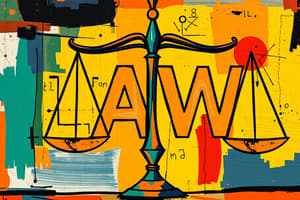Podcast
Questions and Answers
What restrictions were imposed on pastoral groups by the colonial government?
What restrictions were imposed on pastoral groups by the colonial government?
- They were encouraged to participate in all forms of trade.
- They were not allowed to graze their cattle freely in any area.
- They were given free access to white areas and markets.
- They were not allowed to move out of reserves without special permits. (correct)
Why were pastoralists not allowed to enter markets in white areas?
Why were pastoralists not allowed to enter markets in white areas?
- Because they were perceived as dangerous and savage by white settlers. (correct)
- Because they were not interested in participating in trade at all.
- Because they were prohibited from participating in any form of trade.
- Because they preferred trading in their own communities.
What was the impact of the new territorial boundaries and restrictions on pastoralists?
What was the impact of the new territorial boundaries and restrictions on pastoralists?
- It severely changed their lives for the worse. (correct)
- It helped in building stronger relationships with white settlers.
- It improved their access to resources and markets.
- It did not affect their lives significantly.
Why did the police keep a watch on the movements of pastoralists?
Why did the police keep a watch on the movements of pastoralists?
Why were the pastoralists in Kaokoland in Namibia restricted in their movements by the colonial authorities?
Why were the pastoralists in Kaokoland in Namibia restricted in their movements by the colonial authorities?
Why did the colonial authorities confine the Maasai within a reserve and prohibit them from moving in search of pastures?
Why did the colonial authorities confine the Maasai within a reserve and prohibit them from moving in search of pastures?
What was the impact of being confined within a reserve on the Maasai during severe drought?
What was the impact of being confined within a reserve on the Maasai during severe drought?
Why did the colonial restrictions on movement lead to large numbers of Maasai cattle dying of starvation and disease during drought?
Why did the colonial restrictions on movement lead to large numbers of Maasai cattle dying of starvation and disease during drought?
Why were many communities in India classified as Criminal Tribes under the Criminal Tribes Act?
Why were many communities in India classified as Criminal Tribes under the Criminal Tribes Act?
What was the purpose of imposing tax on pastoralists' animals in India?
What was the purpose of imposing tax on pastoralists' animals in India?
Why were pastoralists required to show a pass and pay tax when entering a grazing tract in India?
Why were pastoralists required to show a pass and pay tax when entering a grazing tract in India?
Why did the contractors who collected grazing taxes try to extract as high a tax as they could?
Why did the contractors who collected grazing taxes try to extract as high a tax as they could?
What was the impact of the Criminal Tribes Act on certain communities in India?
What was the impact of the Criminal Tribes Act on certain communities in India?
What was the purpose of imposing tax on pastoralists' animals in India?
What was the purpose of imposing tax on pastoralists' animals in India?
How did the tax collection system change for pastoralists between the 1850s and 1880s in India?
How did the tax collection system change for pastoralists between the 1850s and 1880s in India?
How did pastoralists have to prove their eligibility to enter grazing tracts in India?
How did pastoralists have to prove their eligibility to enter grazing tracts in India?
Flashcards are hidden until you start studying
Study Notes
Restrictions on Pastoralists
- Colonial governments imposed restrictions on pastoral groups, limiting their movement and access to markets and grazing lands.
- Pastoralists were not allowed to enter markets in white areas, restricting their economic opportunities.
- New territorial boundaries and restrictions led to a significant impact on pastoralists, affecting their livelihoods and way of life.
Surveillance and Control
- Police kept a watch on the movements of pastoralists, monitoring their activities and restricting their freedom.
- In Kaokoland, Namibia, colonial authorities restricted the movements of pastoralists, limiting their access to grazing lands and resources.
Maasai and Reserve System
- Colonial authorities confined the Maasai within a reserve, prohibiting them from moving in search of pastures, leading to severe consequences during drought.
- During severe drought, the Maasai were confined within a reserve, leading to the death of large numbers of cattle due to starvation and disease.
- The confinement of the Maasai within a reserve limited their ability to adapt to changing environmental conditions, leading to devastating consequences.
Taxation and Control in India
- Many communities in India were classified as Criminal Tribes under the Criminal Tribes Act, subjecting them to surveillance and control.
- The colonial authorities imposed a tax on pastoralists' animals in India, aimed at generating revenue and controlling the movement of pastoralists.
- Pastoralists were required to show a pass and pay tax when entering a grazing tract in India, restricting their access to resources.
- Contractors who collected grazing taxes tried to extract as high a tax as they could, exploiting pastoralists.
- The Criminal Tribes Act had a significant impact on certain communities in India, stigmatizing and criminalizing them.
- The tax collection system for pastoralists in India changed between the 1850s and 1880s, with the introduction of new regulations and taxes.
- Pastoralists had to prove their eligibility to enter grazing tracts in India, demonstrating their ownership and rights to the land.
Studying That Suits You
Use AI to generate personalized quizzes and flashcards to suit your learning preferences.




